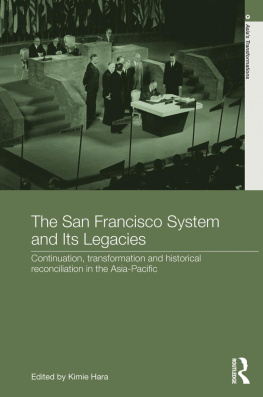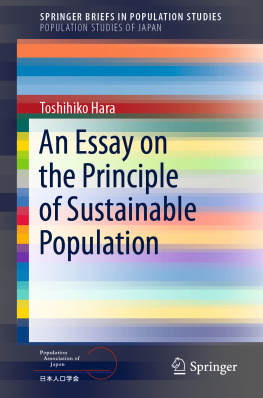The San Francisco System and Its Legacies
In September 1951, Japan signed a peace treaty with forty-eight countries in San Francisco; in April 1952, the treaty came into effect. The San Francisco Peace Treaty is an international agreement that in significant ways shaped the post-World War II international order in the Asia-Pacific. With its associated security arrangements, it laid the foundation for the regional structure of Cold War confrontation: the San Francisco System fully reflected the strategic interests and policy priorities of the peace conferences host nation, the United States. The treaty fell far short of settling outstanding issues in the wake of the Pacific War or facilitating a clean start for the post-war period. Rather, critical aspects of the settlement were left equivocal, and continue to have significant and worrisome implications for regional international relations.
This book examines the key developments of the contentious political and security issues in the Asia-Pacific that share a common foundation in the post-war disposition of Japan, particularly the San Francisco Peace Treaty. These include both tangible and intangible issues, such as disputes over territories and history problems. Taking the San Francisco System as its conceptual grounding, the authors examine how these issues developed and have remained contentious long after the San Francisco arrangements. To provide bases for producing solutions, the chapters offer comprehensive accounts that explain and deepen our understanding of these complex regional issues and the San Francisco System as a whole.
By closely and systematically examining the legacy and various ramifications of the San Francisco System, this fascinating book adds to our understanding of current and growing tensions in the region. As such, it will be of great interest to students and scholars of Asian studies, history, international relations, and politics.
Kimie Hara is Professor and the Renison Research Professor at the University of Waterloo, where she is also the Director of East Asian Studies at Renison University College.
Asias transformations
Edited by Mark Selden
Cornell University, USA
The books in this series explore the political, social, economic, and cultural consequences of Asias transformations in the twentieth and twenty-first centuries. The series emphasizes the tumultuous interplay of local, national, regional and global forces as Asia bids to become the hub of the world economy. While focusing on the contemporary, it also looks back to analyze the antecedents of Asias contested rise.
This series comprises several strands:
Asias transformations
Titles include:
1 Debating Human Rights*
Critical essays from the United States and Asia
Edited by Peter Van Ness
2 Hong Kongs History*
State and society under colonial rule
Edited by Tak-Wing Ngo
3 Japans Comfort Women*
Sexual slavery and prostitution during World War II and the US occupation
Yuki Tanaka
4 Opium, Empire and the Global Political Economy*
Carl A. Trocki
5 Chinese Society*
Change, conflict and resistance
Edited by Elizabeth J. Perry and Mark Selden
6 Maos Children in the New China*
Voices from the Red Guard generation
Yarong Jiang and David Ashley
7 Remaking the Chinese State*
Strategies, society and security
Edited by Chien-min Chao and Bruce J. Dickson
8 Korean Society*
Civil society, democracy and the state
Edited by Charles K. Armstrong
9 The Making of Modern Korea*
Adrian Buzo
10 The Resurgence of East Asia*
500, 150 and 50 year perspectives
Edited by Giovanni Arrighi, Takeshi Hamashita, and Mark Selden
11 Chinese Society, second edition*
Change, conflict and resistance
Edited by Elizabeth J. Perry and Mark Selden
12 Ethnicity in Asia*
Edited by Colin Mackerras
13 The Battle for Asia*
From decolonization to globalization
Mark T. Berger
14 State and Society in 21st Century China*
Edited by Peter Hays Gries and Stanley Rosen
15 Japans Quiet Transformation*
Social change and civil society in the 21st century
Jeff Kingston
16 Confronting the Bush Doctrine*
Critical views from the Asia-Pacific
Edited by Mel Gurtov and Peter Van Ness
17 China in War and Revolution, 18951949*
Peter Zarrow
18 The Future of US-Korean Relations*
The imbalance of power
Edited by John Feffer
19 Working in China*
Ethnographies of labor and workplace transformations
Edited by Ching Kwan Lee
20 Korean Society, second edition*
Civil society, democracy and the state
Edited by Charles K. Armstrong
21 Singapore*
The state and the culture of excess
Souchou Yao
22 Pan-Asianism in Modern Japanese History*
Colonialism, regionalism and borders
Edited by Sven Saaler and J. Victor Koschmann
23 The Making of Modern Korea, 2nd edition*
Adrian Buzo
24 Re-writing Culture in Taiwan*
Edited by Fang-long Shih, Stuart Thompson, and Paul-Franois Tremlett
25 Reclaiming Chinese Society*
The new social activism
Edited by You-tien Hsing and Ching Kwan Lee
26 Girl Reading Girl in Japan*
Edited by Tomoko Aoyama and Barbara Hartley
27 Chinese Politics*
State, society and the market
Edited by Peter Hays Gries and Stanley Rosen
28 Chinese Society, 3rd edition*
Change, conflict and resistance
Edited by Elizabeth J. Perry and Mark Selden
29 Mapping Modernity in Shanghai
Space, gender, and visual culture in the Sojourners City, 185398
Samuel Y. Liang
30 Minorities and Multiculturalism in Japanese Education
An interactive perspective
Edited by Ryoko Tsuneyoshi, Kaori H Okano, and Sarane Boocock
31 Japans Wartime Medical Atrocities
Comparative inquiries in science, history, and ethics
Edited by Jing-Bao Nie, Nanyan Guo, Mark Selden, and Arthur Kleinman
32 State and Society in Modern Rangoon
Donald M. Seekins
33 Learning Chinese, Turning Chinese*
Becoming sinophone in a globalised world
Edward McDonald
34 Aesthetic Constructions of Korean Nationalism
Spectacle, politics and history
Hong Kal
35 Popular Culture and the State in East and Southeast Asia
Edited by Nissim Otmazgin and Eyal Ben Ari
36 Japans Outcaste Abolition
The struggle for national inclusion and the making of the modern state
Noah Y. McCormack
37 The Market and Temple Fairs of Rural China
Red fire
Gene Cooper
38 The Role of American NGOs in Chinas Modernization
Invited influence
Norton Wheeler
39 State, Society and the Market in Contemporary Vietnam
Property, power and values
Edited by Hue-Tam Ho Tai and Mark Sidel
40 East Asia Beyond the History Wars
Confronting the ghosts of violence
Tessa Morris-Suzuki, Morris Low, Leonid Petrov, and Timothy Yun Hui Tsu
41 China
How the empire fell
Joseph W. Esherick and C.X. George Wei
42 The Political Economy of Affect and Emotion in East Asia
Jie Yang
43 Remaking Chinas Great Cities








![Scott O’Hara - Five-Star Fugitive [= Border Town Girl]](/uploads/posts/book/907914/thumbs/scott-o-hara-five-star-fugitive-border-town.jpg)



